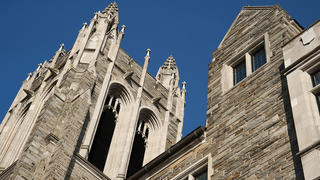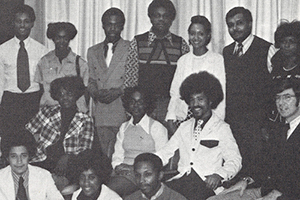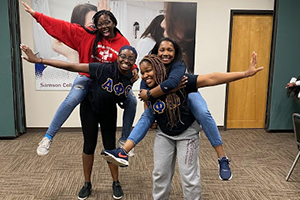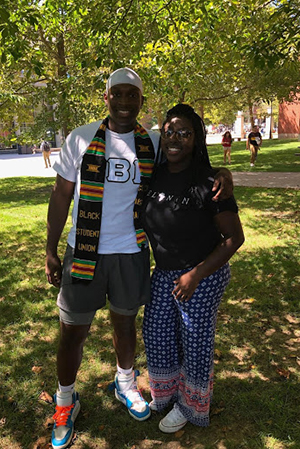A Voice for Change: 50 Years of the Black Student Union at USciences

Editor's note: This article was written prior to University of the Sciences' merger with and into Saint Joseph's University and does not reflect the current, combined institution. References to programs, offices, colleges, employees, etc., may be historical information.
 In 1971, a handful of students who sought to offer a voice for Black students on campus came together to found the precursor to the Black Student Union, the first student group of its kind at what was then Philadelphia College of Pharmacy and Science.
In 1971, a handful of students who sought to offer a voice for Black students on campus came together to found the precursor to the Black Student Union, the first student group of its kind at what was then Philadelphia College of Pharmacy and Science.
Motivated by the civil rights movement and a racial climate in the country and on college campuses in the 1960s and 70s, the students were motivated to form a group separate from others where their issues might be heard and addressed.
“They had friends in a Black Student League at St. Joseph's College (now University) and wanted a platform or group that could speak for the Black students on campus, rather than speaking out as individuals that could be easily brushed aside,” said Joseph W. Ruane, PhD, Emeritus Professor of Sociology and Health Policy, who was the faculty advisor for the group.
Today, 50 years later, the mission and values of empowerment, education, and diversity are just as important.
“The legacy of the Black Student Union is important because we represent the voice of the people of color on campus,” said Massandje Dosso, current BSU President. “It is important for black students to have a space where we are surrounded by a community who supports us and where we feel comfortable and welcomed.”
 The BSU strives to promote political, cultural, educational, professional, and social consciousness and aims to stimulate an appreciation, awareness, and development of African American cultural heritage. The group serves as a positive influence and a resource for, but not exclusively to, all minority populations of the university, to be inspired by, and to inspire the community. Other organizations have since emerged to represent other minority or cultural populations, however, BSU is welcoming and representative of them all.
The BSU strives to promote political, cultural, educational, professional, and social consciousness and aims to stimulate an appreciation, awareness, and development of African American cultural heritage. The group serves as a positive influence and a resource for, but not exclusively to, all minority populations of the university, to be inspired by, and to inspire the community. Other organizations have since emerged to represent other minority or cultural populations, however, BSU is welcoming and representative of them all.
The organization was initially turned down when they applied to the administration in the 1970s seeking to form a Black Student Union -- the students were told that the term was too militant, said Neil Pitts P’73, PharmD’04. A few months later, with a new name, the Black Academic Achievement Society was recognized as an official organization. Student officers were elected, Dr. Ruane remained the faculty advisor and meetings took place monthly, with the BAAS designation remaining into the 1980s. In 1985 the name of the organization was changed to Black Student Union, which had become more common across college campuses.
“After growing up as an assistant pastor, and getting to meet Dr. Martin Luther King a couple of times, it was a trip to Bolivia when I decided I wanted to work on diversity in the U.S., so my jobs led me to education,” said Dr. Ruane. “When I got to PCPS I saw it was an institution that needed to change. I saw the student request to start a BSU as something necessary for the Black students to give them a voice, and it played a large role in the major changes the university has made, both personnel-wise and academically.”
 The officers of the BSU began meeting with BSUs from other local colleges and participating in socials. The organization on campus was expanding and as the university gained more African American students, membership increased and monthly meetings were also well attended by non-Black students.
The officers of the BSU began meeting with BSUs from other local colleges and participating in socials. The organization on campus was expanding and as the university gained more African American students, membership increased and monthly meetings were also well attended by non-Black students.
Under Dr. Ruane’s leadership, the students involved in BSU began a series of events that are still hallmarks of the organization today including a fashion show and health clinics and screenings for the Southwest Philadelphia community.
In addition to events, the BSU in 2021 is working to meet the needs of students by forming a mentoring program. The organization is also collaborating with alumni to help students with topics like financial planning, interview skills, leadership development and preparing for life after college. The series called “#CareerGoals” are professional development events featuring speakers like Amber Jones PhD’22 and others who share their experience as young, black professionals.
As civil unrest and social justice became a part of the national conversation again in the summer of 2020 and in the months since, the BSU sought to create a space where students feel comfortable talking about their feelings, said Dosso. The organization hosted a series of talks on race over the academic year.
“By doing this we are able to hear each other’s voice and discuss ways to best support each other during these difficult times,” said Dosso.
The organization has also worked with University leadership on Diversity, Equity, and Inclusion initiatives on campus.
